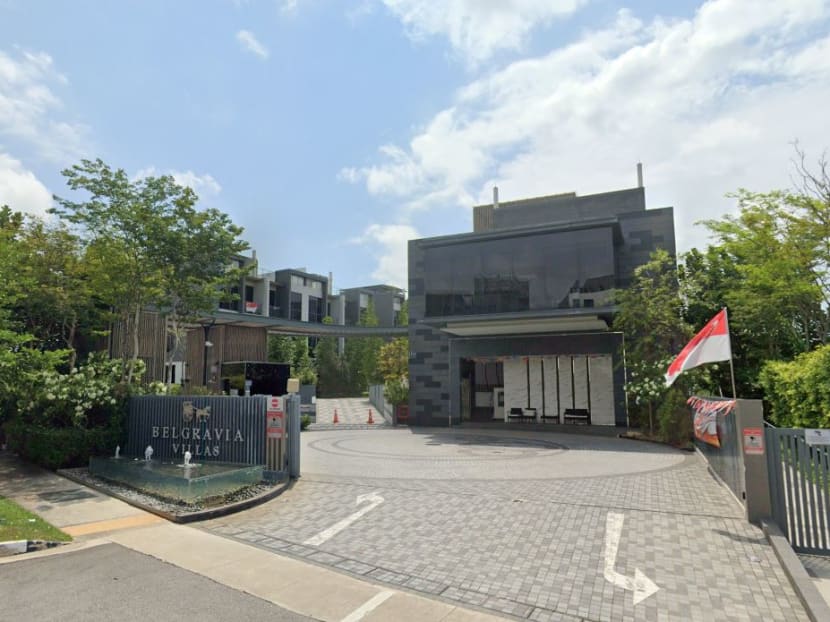Woman confesses to acting as nominee for foreigners to buy landed properties in Singapore
SINGAPORE — A 49-year-old woman confessed in court on Tuesday (Dec 14) to violating the Residential Property Act by buying landed properties and holding them in trust under her name for three foreigners.

A screengrab from Google Maps showing Belgravia Villas in Ang Mo Kio.
- Song Fanrong helped her friends buy semi-detached houses in Ang Mo Kio
- This was because they were foreigners and not eligible to buy such property under Singapore's laws
- She said she would transfer the properties to them once they became Singapore citizens
- She is set to be sentenced on Jan 5, 2022, with the prosecution seeking one month's jail
SINGAPORE — A 49-year-old woman confessed in court on Tuesday (Dec 14) to violating the Residential Property Act by buying landed properties and holding them in trust under her name for three foreigners.
Song Fanrong, a Singaporean, is set to be sentenced on Jan 5 next year after she pleaded guilty to one charge of acquiring residential property as the nominee of a foreign person.
District Judge Shaifuddin Saruwan will consider two similar charges during sentencing.
The court heard that the Act was enacted to strike a balance between ensuring that the limited supply of landed residential properties in Singapore remains the "primary preserve of Singapore citizens” and allowing selected foreigners who have demonstrated "social commitment and are making significant contributions to Singapore” to also own landed houses.
Based on guidelines by the Singapore Land Authority (SLA), foreigners wishing to buy such properties must submit an application to the statutory board.
These restricted properties include vacant residential land, terraced houses, semi-detached houses, bungalows or detached houses, non-commercial-use shophouses and association premises.
The court further heard that in 2013, Song became acquainted with Wang Chen, a China national who wanted to immigrate to Singapore and own a house here.
Song recommended the Belgravia Villas estate, a freehold private residential cluster in Ang Mo Kio, to him. She also offered to buy the property on his behalf and transfer its ownership to him once he obtained his Singapore citizenship.
Wang accepted her offer and signed a trust agreement over the purchase, which stated that he was the buyer and owner, while Song was merely a trustee.
The agreement also stated that Song was buying the house on his behalf because he was not a Singapore citizen, and that he was to bear all costs for the property and make payment to Song’s bank account in China.
Wang then transferred S$1.8 million to Song’s account.
In September 2014, Song entered into a sales and purchase agreement with the developer of Belgravia Villas for a unit that cost about S$3.4 million.
Deputy Public Prosecutor (DPP) Hon Yi said that Song also executed sale and purchase agreements for units in Belgravia Villas for two other foreigners. One of them, Chen Xiaopu, was charged in court earlier this week.
When they later stopped paying for the properties, however, all three agreements went into default.
The developer then deducted the contractual penalties from the sums already paid through Song by the beneficiaries, took away Song’s and the beneficiaries' rights to the properties, and surrendered the remaining sum totalling about S$1.6 million to the police’s commercial affairs department.
The department had received a report from SLA about Song buying four semi-detached properties at Belgravia Villas.
Had she not broken the law, the developer would ordinarily have paid the S$1.6 million sum to Song, since it formed part of the funds that the foreigners paid for the properties, DPP Hon told the court.
The prosecutor sought one month's jail for Song, noting that freehold and landed properties in Singapore are prized by many because their value often appreciates over time.
He added: “Apart from providing homes for people, it is also known that property is a good investment — ofttimes, sought-after properties may be purchased and resold soon after, making a tidy profit for the seller. We thus have laws in place to keep foreigners from buying up, and possibly speculating in, land in Singapore.”
Song’s lawyer Alain Abraham Johns told the court that she was bankrupt and would not be able to pay a fine if it were imposed.
The lawyer said that she was merely helping her friends and did not intend to profit, while the buyers had no intention of speculating in property here.
Song could receive a fine of up to S$100,000 or a jail term of up to three years, or both. Court documents did not indicate what her occupation is.
Court documents did not indicate if the other foreigners, aside from Chen, would be or have been prosecuted.











